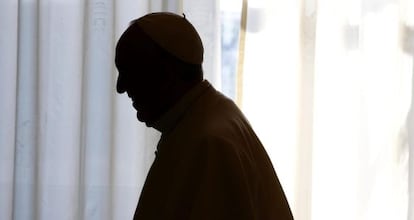How the pope’s influence permeates every part of Argentinean society
Pontiff's decision to meet with president in middle of key election race raises eyebrows


When the topic of conversation with any Argentinean politician or analyst turns to Pope Francis, the voices change: they grow deeper and quieter.
The pope stands in the shadows of Argentinean politics, but he is an omnipresent figure whose actions and words are closely dissected for any clues to his stance on domestic issues.
Privately, they say that Jorge Bergoglio is “a pure Peronist and a great politician with a notable ability for maneuvering.”
Bergoglio regularly had fiery confrontations with the previous and current Kirchner administrations
When he served as archbishop of Buenos Aires, he wielded a lot of influence and regularly had fiery confrontations with the previous Néstor Kirchner and current Cristina Fernández de Kirchner administrations.
After his election as pope, those who knew him predicted that he would cause shockwaves inside the Catholic Church because of his penchant for politics.
Just about everyone in the country devotes special attention – whether through speculation or by examining real actions – to the most famous Argentinean on the planet.
Now, his recent decision to grant a private audience to President Fernández de Kirchner in the middle of a decisive presidential primary campaign has stirred up controversy in private conversations and among newspaper columnists.
Opposition leaders have not come out against the scheduled meeting on June 7, mainly because they don’t want to criticize such a popular person as the pope.
The government had been pushing for this encounter for some time; it will be the fifth meeting in two years between Bergoglio and the Argentinean leader.
In a country whose residents treat politics as a national sport and where a tumultuous presidential campaign will soon get underway, people have tried to come up with reasons for the pope’s decision.
Those who do not support the Kirchnerite movement are angry about the private audience, while the pope’s defenders explain that he could not refuse such a request by the head of state of his own country.
But perhaps Pope Francis’ most meaningful gesture is his announcement that he will not travel to Argentina until next year, when Fernández de Kirchner is no longer in office.
Soon after he was elected, the pope didn’t return home for a visit, but instead flew to Brazil. And in July he is scheduled to pay official visits to Bolivia, Paraguay and Ecuador. He will be in two nations that share a common border with Argentina, but he will not step over it.
Politicians, judges, businessmen and other powerful people in Argentina have traveled frequently to Rome, where they are usually granted a private audience with the pope. These visits have typically caused reverberations in Argentina; so much so that the pope has publicly asked that his country stop using him for their own political purposes.
Many Argentineans try to use the pope’s name to their own benefit, but the pontiff speaks through his actions
The opposition said it believes that the pontiff should not be giving too many positive nods to Fernández de Kirchner. But people who know Francis maintain that the pope is very distant with the president owing to their clashes in the past.
Yet Pope Francis is also trying to help with a peaceful transition of administrations, regardless of who wins this year’s elections.
While many people in Argentina try to use the pope’s name for their own benefit, the pontiff speaks through his actions.
For example, he has received two of the three leading contenders in the upcoming race: Buenos Aires city Mayor Mauricio Macri, a conservative, and provincial governor Daniel Scioli, who is supported by the Kirchner wing of the Peronist Party.
The pope did not meet with Sergio Massa, who leads the dissenting Peronist wing. Massa served as cabinet chief for President Fernández de Kirchner until they both had a falling out. Under her orders, Massa carried out a behind-the-scenes if unsuccessful operation to remove Bergoglio as Buenos Aires archbishop.
There is much speculation that the pope is backing Scioli, but it is unlikely that he will come out publicly in favor of him.
Tu suscripción se está usando en otro dispositivo
¿Quieres añadir otro usuario a tu suscripción?
Si continúas leyendo en este dispositivo, no se podrá leer en el otro.
FlechaTu suscripción se está usando en otro dispositivo y solo puedes acceder a EL PAÍS desde un dispositivo a la vez.
Si quieres compartir tu cuenta, cambia tu suscripción a la modalidad Premium, así podrás añadir otro usuario. Cada uno accederá con su propia cuenta de email, lo que os permitirá personalizar vuestra experiencia en EL PAÍS.
¿Tienes una suscripción de empresa? Accede aquí para contratar más cuentas.
En el caso de no saber quién está usando tu cuenta, te recomendamos cambiar tu contraseña aquí.
Si decides continuar compartiendo tu cuenta, este mensaje se mostrará en tu dispositivo y en el de la otra persona que está usando tu cuenta de forma indefinida, afectando a tu experiencia de lectura. Puedes consultar aquí los términos y condiciones de la suscripción digital.








































